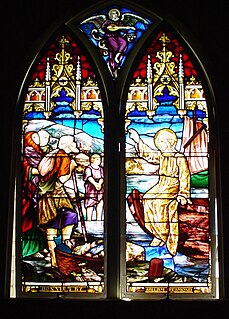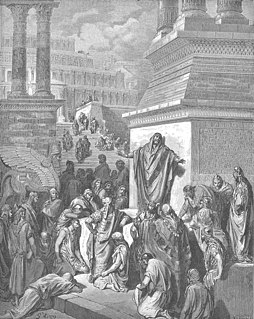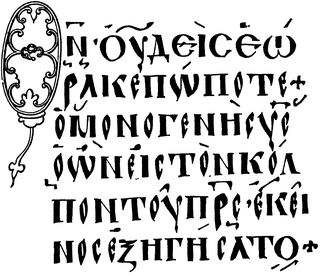Related Research Articles

Luke 16 is the sixteenth chapter of the Gospel of Luke in the New Testament of the Christian Bible. It records the teachings and parables of Jesus Christ, including the famous parable of the "rich man and Lazarus". The book containing this chapter is anonymous, but early Christian tradition uniformly affirmed that Luke the Evangelist composed this Gospel as well as the Acts of the Apostles.

Matthew 9:3 is a verse in the ninth chapter of the Gospel of Matthew in the New Testament.

Matthew 9:4 is a verse in the ninth chapter of the Gospel of Matthew in the New Testament.

Matthew 9:6 is the sixth verse in the ninth chapter of the Gospel of Matthew in the New Testament.
Matthew 9:10 is a verse in the ninth chapter of the Gospel of Matthew in the New Testament.

Matthew 10:3 is the third verse in the ninth chapter of the Gospel of Matthew in the New Testament.

Matthew 10:7 is the seventh verse in the ninth chapter of the Gospel of Matthew in the New Testament.

Matthew 12:1 is the first verse in the twelfth chapter of the Gospel of Matthew in the New Testament of Christian Bible.
Matthew 9:17 is a verse in the ninth chapter of the Gospel of Matthew in the New Testament.
Matthew 11:12 is the twelfth verse in the eleventh chapter of the Gospel of Matthew in the New Testament.
Matthew 11:28 is the 28th verse in the eleventh chapter of the Gospel of Matthew in the New Testament.

Matthew 10:15 is the fifteenth verse in the ninth chapter of the Gospel of Matthew in the New Testament.
Matthew 10:22 is a verse in the tenth chapter of the Gospel of Matthew in the New Testament.

Matthew 12:42 is the 42nd verse in the twelfth chapter of the Gospel of Matthew in the New Testament.

Matthew 12:41 is the 41st verse in the twelfth chapter of the Gospel of Matthew in the New Testament.
Matthew 12:28 is the 28th verse in the twelfth chapter of the Gospel of Matthew in the New Testament.

The return of the family of Jesus to Nazareth, also known as the return from Egypt, appears in the reports of the early life of Jesus given in the canonical gospels. Both of the gospels which describe the nativity of Jesus agree that he was born in Bethlehem and then later moved with his family to live in Nazareth. The Gospel of Matthew describes how Joseph, Mary, and Jesus went to Egypt to escape from Herod the Great's slaughter of the baby boys in Bethlehem. Matthew does not mention Nazareth as being the previous home of Joseph and Mary; he says that Joseph was afraid to go to Judea because Herod Archelaus was ruling there and so the family went to Nazareth instead. The Gospel of Luke, on the other hand, does not record anything about the flight to Egypt, but says that Joseph had been previously living in Nazareth, and returned there after the Presentation of Jesus at the Temple.

John 1:16 is the sixteenth verse in the first chapter of the Gospel of John in the New Testament of the Christian Bible.

John 1:19 is the nineteenth verse in the first chapter of the Gospel of John in the New Testament of the Christian Bible.

John 1:46 is the 46th verse in the first chapter of the Gospel of John in the New Testament of the Christian Bible.
References
- ↑ Note on Luke 16 in CSB; Luke 16:16: Matthew 5:18; 11:12–13; 24:35; Mark 13:31
- ↑ Robert Witham, Annotations on the New Testament of Jesus Christ. Dublin: 1730.
- ↑ Cornelius Cornelii a Lapide; Thomas Wimberly Mossman The great commentary of Cornelius à Lapide, London: J. Hodges, 1889-1896.
- ↑ "Catena aurea: commentary on the four Gospels, collected out of the works of the Fathers: Volume 6, St. John. Oxford: Parker, 1874. Thomas Aquinas".
 This article incorporates text from this source, which is in the public domain .
This article incorporates text from this source, which is in the public domain .